October 8, 2021

Northwest Farm Credit Services, the Northwest’s leading agricultural lending cooperative, has released its quarterly Market Snapshot reports covering the state of major agricultural commodities in the region. Northwest FCS teams throughout Idaho, Montana, Oregon and Washington monitor conditions and report outlooks for commodities financed by the co-op.
All Market Snapshots are posted online at Industry Insights.
Northwest FCS’ 12-month outlook for the agricultural commodities most common in the Northwest are summarized below.
Apples – Slightly profitable returns are expected for apple growers. A larger crop compared to 2020, coupled with weather impacts to fruit quality should be offset by strong retail demand. However, for growers impacted by quality issues, lower packouts will reduce returns.
Cattle – Cow/calf producers who adjust to available feed resources will see slightly profitable returns. Producers with the ability to hedge lower feed costs or secure feed at a cost only slightly above historical averages will remain profitable. Drought-related insurance payments from Pasture, Rangeland, Forage and Livestock Risk Protection programs are expected to provide supplemental margin.
Cherries – Overall, breakeven returns are expected for the Northwest cherry industry. Pricing did not recover from early season lows. Consumer interest was expected to be favorable, but reduced fruit quality and cherry sizes resulted in lackluster demand. Returns on cherries with limited damage and favorable fruit size are good; however, pricing on small or low-quality cherries is likely below breakeven. Some acreage wasn’t harvested due to heat damage and growers without crop insurance will suffer losses.
Dairy – The dairy outlook anticipates unprofitable returns. Feed costs for 2022 are predetermined by the 2021 harvest. Hay prices are up 30%-35% and grain corn and corn silage prices are up 20%-25% year over year. This could increase the cost of production by as much as $2 per cwt without a corresponding increase in milk price. The Farm Service Agency’s Dairy Margin Converge program will soften the blow to small dairies but is only supplemental for large dairies.
Fisheries– Fisheries will be profitable. Pollock prices remain elevated especially for higher quality products like fillets. The salmon season in Alaska was generally strong and prices in Bristol Bay, Alaska’s largest revenue salmon fishery, are advantageous. Consumers continue to demand seafood and prices are reflecting that in all products, from crab to cod.
Forest Products – Although down from recent records, solid profits are anticipated for forest products manufacturers. Timberland owners are also expected to be profitable. Given the avalanche in pricing from a processing perspective, several key factors point to continued demand for finished wood products. Timberland owners are optimistic that pricing will strengthen through 2021 despite a small reduction in log prices following the drop in finished products price.
Related: Extreme conditions challenge Northwest producers
Hay – The hay industry outlook calls for variable returns. Producers in drought-stricken areas produced less hay and losses are likely. On the other hand, producers with stable irrigation supplies will be profitable. Rising input costs will weigh on margins for all producers in 2022.
Nursery/Greenhouse – The nursery/greenhouse industry did not experience significant changes this quarter.
Onions – The profitability outlook suggests slightly profitable onion returns. Producers with high-quality, large onions will have favorable returns. Producers with smaller onions will face headwinds.
Pears – Pear growers can expect slight profits. The industry has been successful in growing customer demand with a shortened window for ripening, investments in research on new varieties and increased marketing to showcase the health benefits of eating pears. However, labor and input costs are continuing to increase from supply chain shortages and are cutting into profit margins.
Potatoes– Slightly profitable returns are expected for contract potato producers. Uncontracted potato producers will benefit from higher prices as modestly lower yields are realized.
Sugar Beets – The sugar beet outlook for the 2021 crop is favorable with profitable prices, yields and sugar content. Looking ahead to 2022, higher fertilizer and chemical cost will weigh on producer profitability.
Wheat – Slightly profitable returns are expected for wheat producers. Drought conditions curbed winter wheat production and spring crops yields were poor in many areas. However, crop insurance and government payments will boost producer returns for 2021. Rising input costs will drive narrower margins in 2022.
Wine/Vineyard – Slight profits are expected for both vineyards and wineries. Although wine grape prices are increasing, reduced yields will limit growers’ returns. Consumers are showing a willingness to pay more for wine again, but overall consumption remains flat, and the industry continues to fight for market share with other adult beverage segments.
Source: Northwest Farm Credit Services, which is solely responsible for the information provided and is wholly owned by the source. Informa Business Media and all its subsidiaries are not responsible for any of the content contained in this information asset.
You May Also Like




